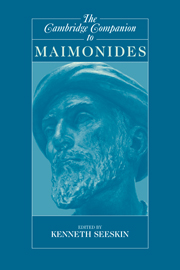Book contents
- Frontmatter
- Introduction
- 1 Moses Maimonides: An Intellectual Portrait
- 2 The Guide and Maimonides’ Philosophical Sources
- 3 Metaphysics and Its Transcendence
- 4 Maimonides’ Epistemology
- 5 Maimonides’ Philosophy of Science
- 6 Maimonides’ Moral Theory
- 7 Maimonides’ Political Philosophy
- 8 Jurisprudence
- 9 Bible Commentary
- 10 Spiritual Life
- 11 Maimonides: Esotericism and Educational Philosophy
- 12 Maimonides--A Guide for Posterity
- Bibliography
- Index
4 - Maimonides’ Epistemology
Published online by Cambridge University Press: 28 August 2006
- Frontmatter
- Introduction
- 1 Moses Maimonides: An Intellectual Portrait
- 2 The Guide and Maimonides’ Philosophical Sources
- 3 Metaphysics and Its Transcendence
- 4 Maimonides’ Epistemology
- 5 Maimonides’ Philosophy of Science
- 6 Maimonides’ Moral Theory
- 7 Maimonides’ Political Philosophy
- 8 Jurisprudence
- 9 Bible Commentary
- 10 Spiritual Life
- 11 Maimonides: Esotericism and Educational Philosophy
- 12 Maimonides--A Guide for Posterity
- Bibliography
- Index
Summary
There is nothing Maimonides values more than knowledge, especially knowledge of metaphysics or, in medieval terminology, “divine science.” The Mishneh Torah opens with the basic metaphysical and scientific truths everyone is obligated to know and ends with a depiction of the messianic age as an era in which the whole world is engaged exclusively in the pursuit of knowledge. The Guide of the Perplexed opens and closes with two parables that depict the “true human perfection,” not as the moral or ritual life but as “the acquisition of the rational virtues . . . true opinions concerning the divine things” (GP 3.54, p. 635). And throughout the Guide, Maimonides reconstructs traditional religious concepts in epistemic terms: To love God is to know Him (GP 3.51, p. 621), and the worst form of idolatry is a cognitive error, “believing [God] to be different from what He really is” (GP 1.36, p. 84).
Yet Maimonides’ philosophical corpus contains no systematic discussion of the concept of knowledge. One reason may be, as Maimonides says about the plan of the Guide, that his “purpose . . . was not to compose something on natural science, or to make an epitome of divine science,” that is, to explain sublunar physics, cosmology, or metaphysics. Writing within the context of Arabic Aristotelianism, Maimonides could take many theoretical notions for granted. Even where he must engage in its explication, he says his aim is never the idea itself but to give a “key to the understanding” of a parable or “secret” in the books of prophecy (GP 2.2, p. 254). To piece together a picture of Maimonides’ epistemology, one must therefore look to his accounts of divine attributes, prophecy, divine providence, and cosmology. Maimonides’ comment also hints at a second possible reason: Because these topics are bound up with “secrets,” he provides no explicit discussion of them. But in the case of knowledge, what could that secret be?
- Type
- Chapter
- Information
- The Cambridge Companion to Maimonides , pp. 105 - 133Publisher: Cambridge University PressPrint publication year: 2005
- 8
- Cited by



